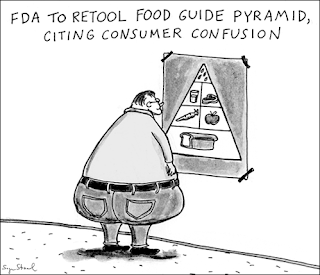While web surfing recently I learned that I should be dead or obese since I follow a low-carb high-fat diet.
 Happily, as of today, I am neither.
Happily, as of today, I am neither.My misinformation came from Cooking Light magazine, which is as relevant to modern day Americans as a telephone book.
In response to its readers' question -- "Can I Eat Carbs and Still Lose Weight?" -- Cooking Light contributing editor Carolyn Williams, RD, Ph.D., replied, "Banishing carbs altogether in an effort to lose weight isn't
realistic or even desirable."
Williams did not really address the concern because low-carb is not the same as "banishing carbs altogether" (although some people do just that and survive). More commonly, people elect to follow a severely reduced carbohydrate diet, which can be as high as 50 or 60 grams of carbs per day, mostly in the form of vegetables, berries, nuts and dairy. They not only lose weight, but also reduce or eliminate the need for Big Pharma medications (many of which are advertised in -- yes, you guessed it, Cooking Light!).
Williams did not really address the concern because low-carb is not the same as "banishing carbs altogether" (although some people do just that and survive). More commonly, people elect to follow a severely reduced carbohydrate diet, which can be as high as 50 or 60 grams of carbs per day, mostly in the form of vegetables, berries, nuts and dairy. They not only lose weight, but also reduce or eliminate the need for Big Pharma medications (many of which are advertised in -- yes, you guessed it, Cooking Light!).
Yes, she said essential.
In Williams world, "carbs are designed to be your body’s primary source of energy, and you need an ample amount of carbohydrates each day for your brain and body to function effectively. Only when your body is adequately fueled with carbs can your body also break down fat stores."
She never revealed who exactly "designed" carbs to be the body's primary source of energy since dietary carbohydrates are not only non-essential to human health, they spike insulin and cause the body to store fat.
"If you aren’t consuming enough (carbs)," Williams contended, "you’ll feel the effects—low energy, sluggishness, brain fog, trouble paying attention, and your body will actually go into starvation mode. You’ll start breaking down lean body mass, and your metabolism will slow."
That's exactly what happens to most people who eat the standard American diet (aptly named SAD), of which the majority of calories comes from carbohydrates.
Not surprisingly, Williams fell back on the old energy balance theory popular with the moderation crowd and perpetuated by Coca Cola and other BFFs of the Academy for Nutrition and Dietetics. "Weight loss happens when calories burned daily exceed the calories consumed," she said, "so ultimately weight loss boils down to total calories, not necessarily the specific foods you eat."
Without citing any sources, she stated, "Research even shows that the most effective weight loss occurs when people consume approximately 60% of their calories from carbohydrates" -- as if there were settled science that proves this belief is a fact.
 Worse, she backed up her claim by citing the Dietary Guidelines for Americans, a highly controversial set of recommendations that advises humans to consume 45-65%
of their calories from carbs.
Worse, she backed up her claim by citing the Dietary Guidelines for Americans, a highly controversial set of recommendations that advises humans to consume 45-65%
of their calories from carbs.To her credit, Williams conceded that the quality of carbohydrates counts; so broccoli is better than Cheetos. But her definition of quality is wanting. Williams considers low-fat dairy to be a nutritional good guy, even though it is unsatiating, relatively high in sugar and does not contain enough fat to absorb the re-added vitamins that are lost when dairy processors turn whole milk into expensive white water.
Cooking Light can do much better by its readers and acknowledge, as have many experts in the field who once advocated for low- fat high-carb diets, that the whole concept was a big fail based on bad science.








